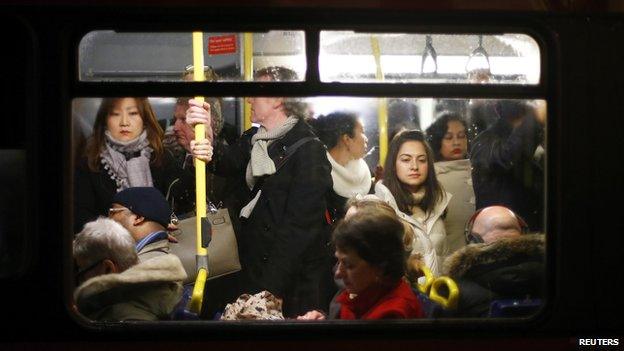How does commuting affect wellbeing?
- Published

Commuters' wellbeing was affected most by travelling long journeys by bus
The daily commute to work is something to be put up with rather than enjoyed, yet how we get there and how long it takes has an impact on how we feel.
That's hardly surprising when you consider that the average worker in Britain spends 54 minutes commuting each day.
This important and ever-increasing chunk of the working week doesn't come without its costs - and they are not just financial.
According to the Office for National Statistics, external, feelings of happiness, life satisfaction and the sense that one's activities are worthwhile all decrease with every successive minute of travel to work.
This is what constitutes personal wellbeing and, in general, the longer the commute the more it shrinks.
Lengthy commutes, between an hour and an hour-and-a-half long, have the most negative effect on personal wellbeing, the ONS research found, while taking the bus to work on a journey lasting more than 30 minutes was the commuting option most likely to give us the grumps.

The 2011 census tells us that 7.2% of working people in England and Wales travel by bus or coach to work, compared to 5% by train and 3.8% by underground or tram.
The large majority, 59%, drive or get a lift in a car or van.
In an ideal world, commuting should not affect psychological health because it is a choice. Commuting journeys increase because people move out of towns and cities to find better housing, more green space and a higher standard of living.
Professor Jenny Roberts, from the University of Sheffield, has researched how wellbeing is affected by changes in commuting times by tracking 7,000 men and 7,000 women over 13 years.
In contrast, the ONS report is based on a one-off survey of more than 60,000 people in employment between 2012 and 2013.
She discovered, in her paper published in the Journal of Health Economics, external, that women were adversely affected by commuting, while men were not, despite the fact that women in general commute less and work shorter hours.
This was after accounting for income, job satisfaction and housing quality.
So why are women more sensitive to time spent commuting?
"The only reason we could come up with was trip-chaining," Prof Roberts explains.
"Women tend to make more interim stops on their journey, via the nursery or the school or the shops, so they have less flexibility and do more multiple activities. This adds stress to commuting."
Commuting affects wellbeing because of the link between stress and mental health, which is well established.
The stress is caused by a lack of control during commuting, caused by delayed trains, traffic jams and unpredictable weather, for example.
Research also shows that boredom and social isolation among commuters can lead to unhappiness.
However, some commuters do find positives in the daily commute because it gives them time to work and read or simply wind down.
'Extreme commuting' is becoming more common and the ONS research suggests that a commute time of three hours of more is often a happier experience than shorter journeys.
This may be because these extra-long journeys are a positive lifestyle choice for extreme commuters, who tend to have a higher average income, and are able to use their travel time more productively as a result.
Those who cycle or walk to work have the advantage of knowing that physical activity improves wellbeing, but the ONS research says that cycling to work can also be a stressful experience.
This is particularly true if commuters cycle because of a lack of other options or on a route through heavy traffic.
In the end, the psychological health of commuters is important because everybody commutes, but we are often reluctant to analyse how we do it, says Prof Rogers.
"Do people really make that calculation when moving out to a suburban house of how much time, how much income it's going to cost and how it's going to affect their mental health?"
- Published27 December 2013
- Published13 January 2014
- Published14 February 2014
- Published2 December 2013
- Published1 July 2013